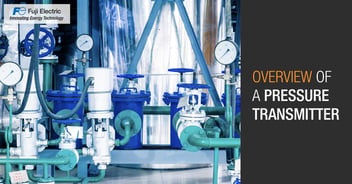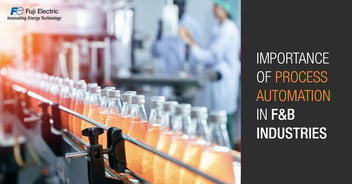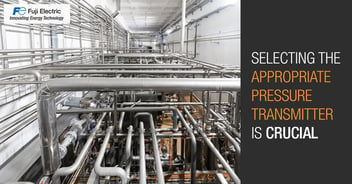Enhancing Operational Efficiency Using Fuji Electric Pressure Transmitter
A pressure transmitter is an industrial instrument used to measure the pressure of liquids, gases, or vapors. It consists of a diaphragm-type sensing element, which detects the change in pressure and converts it into a proportional electrical signal. This electrical signal is then sent to a display device, recorder, or controller, depending on the type of transmitter used. Pressure transmitters are commonly used in oil and gas industries, chemical processing plants, and wastewater treatment systems for process control applications. They are also useful in determining flow rates and pressure drops in pipes, tanks, and other vessels. The use of pressure transmitters can help increase automation in the manufacturing process by providing accurate data and feedback for more efficient decision-making. This reduces human errors and leads to increased efficiency. By automating processes, labor costs are reduced since fewer personnel are needed to monitor and manage the process. With a suitable pressure transmitter, manufacturers can save on manpower costs while achieving high-performance operations. By monitoring and controlling production with a pressure transmitter, potential hazards such as over-pressurization can be minimized or avoided altogether. Pressure transmitters also help protect workers from dangerous chemicals by sending alerts if they reach unsafe levels. The accurate data from pressure transmitters allows manufacturers to optimize their processes and ensure better results in less time and with fewer resources. Pressure transmitters provide enhanced monitoring capabilities for temperature, flow rate, level, and other measurements, allowing quicker response times to change conditions on the production floor and easier tracking of raw material stock levels and inventory counts.
Pressure Transmitter enhancing operational efficiency
The pressure transmitters are designed for industrial applications. They are suitable for use in hydraulics, pneumatics, water management, mobile hydraulics, off-highway vehicles, pumps, compressors, air conditioning and refrigeration systems, plant engineering, automation, and the process industries food, polymers, metals, and cosmetics. This transmitter measures system pressures accurately within tight tolerances to ensure the reliable operation of the application. It has a wide range of input pressure and provides accurate output measurements. It can also measure different pressure units such as psi, mbar, and bar.
Usually, it is expected that the processing facilities must continually generate at appropriate throughput levels in order to meet operational objectives. Attaining production and revenue targets can be the difference between missing deadlines and losing clients. These problems can be overcome by avoiding equipment maintenance, increasing uptime, accounting for process variability, and achieving quicker startup times. Implementing pressure transmitters will enhance operational efficiency by delivering accurate data for process control, enhancing product quality, reducing operational costs, increasing uptime, and enhancing safety in the work environment.
The process insights delivered by the pressure transmitter help simplify the process and enhance reliability. The overall accuracy and reliability of the measurement can be significantly impacted by the physical connections made between a pressure transmitter and the process. Impulse pipework, prone to leaking, clogging, freezing, and other maintenance issues, is frequently used in simple installations. Pressure transmitters can listen to a process's background noise and identify variations from a normal operation that may indicate clogged impulse lines or more serious problems with the process itself, such as flooding in the distillation column, flame instability, or pump cavitation, and result in shutdowns.
The electrical loop that connects a field device to the control room can be checked for integrity by diagnostics, which can alert operators to any anomalies, such as on-scale failures can be caused by environmental factors or human mistakes, such as water in housings and junction boxes, wire corrosion, unstable power supplies, and water in housings.
Accurate and reliable process level measurements might be difficult to obtain in applications involving extremely hot processes, frigid ambient temperatures, or both. Heat tracing is frequently used in hot operations to maintain the high-temperature, high-viscosity fluids used with impulse lines or capillaries at higher temperatures. Heat tracing keeps impulse lines and capillaries from freezing and fill fluid response time from slowing down in cold settings.
Any heat tracing process can become significantly more expensive and complex, and maintaining it involves much work. Applications utilizing heat tracing frequently experience frequent and unforeseen process shutdowns and sub-optimal performance resulting in lower throughput, deteriorated product quality, and cost overrun due to these difficulties. Variations in operating conditions, feedstock, and daily and seasonal environmental changes can all result in a control strategy with wider tolerances around the desired set point of the loop than desired. Operating units may become less productive and efficient as a result. Utilizing pressure transmitters can help in reducing these operational difficulties and helps in enhancing the production quality in the plant. In addition to operating closer to the set point and reducing waste and rework, using high-accuracy pressure transmitters will result in less measurement process variation.
Enhance operational control with Fuji Electric's highly reliable pressure transmitter
Modern pressure measuring equipment increases operational control by enhancing measurement point insights, extending visibility into the process, and increasing connection. The highly reliable pressure transmitter from Fuji helps in efficiently measuring the pressure and helps in enhancing the asset life, minimizing the process variation, and enhancing uptime with better installation and operations. Fuji Electric's Pressure Transmitter is the perfect solution for monitoring pressure in an industrial environment. It is designed with advanced sensing technology to accurately measure high and low-pressure levels. The transmitter has a compact, lightweight design, making it ideal for easy installation and maintenance.
Additionally, its IP65 waterproof rating makes it suitable for use in various industrial environments. The Pressure Transmitter also features robust data storage capabilities, enhanced accuracy, and a wide range of features, including programmable parameters and built-in digital filters to ensure precise readings. These features enable users to get real-time data for process control. By using Fuji Electric's Pressure Transmitter, industries can enhance their operational efficiency by getting more accurate readings that allow them to identify potential issues faster and take preventive measures to optimize productivity.
 China
China Europe
Europe France
France Hong Kong
Hong Kong Indonesia
Indonesia Japan
Japan Singapore
Singapore Thailand
Thailand USA
USA

